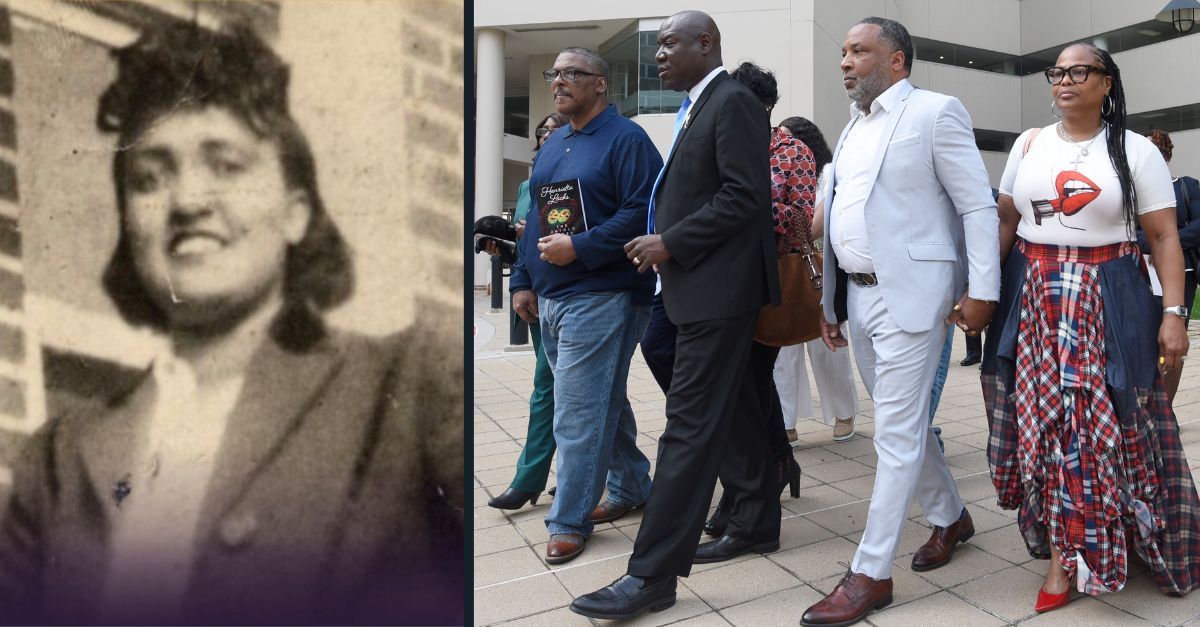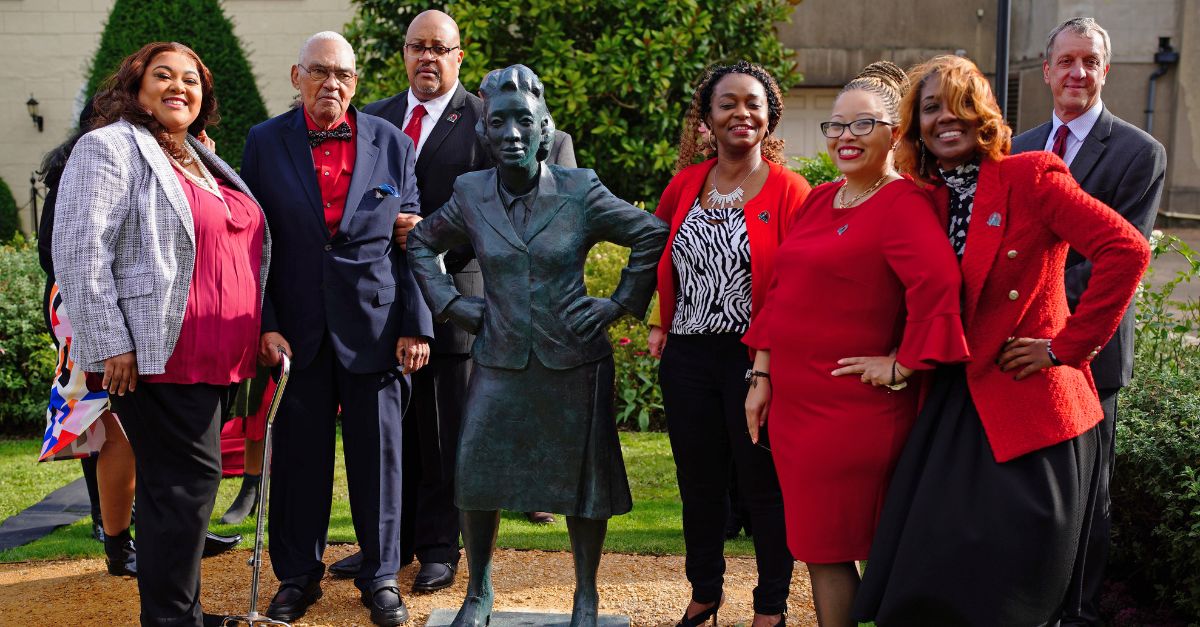
Left: Henrietta Lacks (via attorney Ben Crump/Twitter). Right: FILE – Attorney Ben Crump, second from left, walks with Ron Lacks, left, Alfred Lacks Carter, third from left, both grandsons of Henrietta Lacks, and other descendants of Lacks, outside the federal courthouse in Baltimore, Oct. 4, 2021. The family of Henrietta Lacks is settling a lawsuit against a biotechnology company it accuses of improperly profiting from her cells. Their federal lawsuit in Baltimore claimed Thermo Fisher Scientific has made billions from tissue taken without the Black woman’s consent from her cervical cancer tumor. (AP Photo/Steve Ruark, file)
A yearslong legal battle between a giant biotechnology company and the family of Henrietta Lacks, a Black woman whose cancer cells were taken without her consent and later used as the foundation for an infinite number of pioneering medical discoveries, has come to an end with a settlement agreement, the terms of which are currently being kept under wraps.
The Lacks family announced the settlement with Thermo Fisher Scientific through their attorneys Ben Crump and Chris Seeger on Monday with a press conference that followed Tuesday in Baltimore, Maryland. The announcement coincided with what would have been Henrietta’s 103rd birthday.
Happy birthday Henrietta Lacks! Henrietta died of cancer in 1951, but cells taken from her are still being used today for medical research! Her breakthrough contributions to modern medicine have changed and saved many lives. Today, we thank her for her gift! pic.twitter.com/9GFy7y3IQO
— Ben Crump (@AttorneyCrump) August 1, 2023
Lacks died in poverty in 1951 at just 31 years old after a battle with cervical cancer that would prove fateful not just for her and her descendants, but for the whole of the scientific and medical community. The cells in tissue harvested from her cancerous tumors, without her knowledge, by Johns Hopkins University while she underwent treatment, were discovered to survive and replicate outside of her body.
It was a rarity and a revelation that would lead to groundbreaking findings, including the ability to clone human cells for the very first time. Her cells, later known to scientists as HeLa cells, have also contributed to major breakthroughs across modern medicine, whether for vaccine or genetic research or for the development of treatments for diseases like Parkinson’s, polio, leukemia, HIV/AIDS and even COVID-19.
For all of the abundance she unwittingly provided, Lacks died in a segregated hospital ward after suffering from a vicious disease, her family left to grieve in her wake. She was buried in an unmarked grave in Maryland.
Johns Hopkins has denied ever profiting from the discovery of Lacks’ unique cells.
Read Related Also: Judge Grants State More Time to Respond to Kohberger’s Motion to Dismiss Indictment
After Tuesday’s press conference, according to The Washington Post, her grandson, Alfred Lacks Carter Jr., called the settlement agreement with Thermo Fisher a major relief.
“There couldn’t have been a more fitting day for her to have justice, for her family to have relief. It was a long fight — over 70 years — and Henrietta Lacks gets her day,” he said.
The only statement on the agreement itself that the family was willing to offer was a perfunctory one: “Members of the family of Henrietta Lacks and Thermo Fisher have agreed to settle the litigation filed by Henrietta Lack’s estate in the United States District Court of Baltimore, Maryland. The terms of the agreement will be confidential. The parties are pleased they were able to find a way to resolve this matter outside of the court and will have no further comment about the settlement.”
“The family will get to define the legacy of their grandmother, ” Crump told reporters. “Mr. Lawrence Lacks, the last living child of Henrietta Lacks right now is battling health issues but he went to his children, nephews and nieces and talked about how ‘we have to find a legacy for Henrietta Lacks.’ He fought his whole life to try and get justice for his mother. So, we are very, very elated that in his lifetime, he got a chance to go into a court of law to plead the case for his mother, to say that his mother was not insignificant. That his mother, Henrietta Lacks, was not illiterate, was not inferior. In fact, she was extraordinary. On this birthday, America should acknowledge that she was extraordinary in every way.”

Henrietta Lacks statue. The family of Henrietta Lacks at the unveiling of a statue on the 70th anniversary of her death at Royal Fort House in Bristol. The statue, created by Bristol artist Helen Wilson-Roe, is the first public sculpture of a black woman made by a black woman in the UK. (Photo: Ben Birchall/PA Wire/Press Association via AP Images)
The Lacks family sued Thermo Fisher Scientific in 2021 for unjust enrichment, alleging that the multimillion-dollar company had improperly profited from the Lacks cells and had attempted to cut the family out of any intellectual property rights involving their use. Thermo Fisher initially tried to have the case thrown out, saying the statute of limitations had long expired and that the use of HeLa cells was open commercial practice.
In its lawsuit against the company, the Lacks argued that Thermo Fisher was another company in a long line that took advantage of America’s history of institutionally racist practices and profited from Black suffering.
“Black suffering has fueled innumerable medical progress and profit, without just compensation or recognition,” the family said in its 2021 lawsuit.
Have a tip we should know? [email protected]




